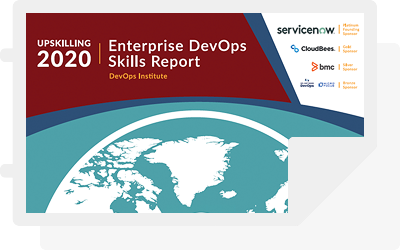The software development industry has been undergoing a shift in mentality and culture over the past few years. This is a response to the changing expectations of customers within the IT sectors. The shift to software as a service (SaaS) business models has brought about a change in how we go about developing software today. DevOps has proven time and again its ability to help IT organizations keep up with the breakneck pace of development required by the competitive climate of the modern tech sector.
The old method of development involved having developers code the project which would then be handed off to QA for testing followed by operations taking over finally and planning the releases and version management. This structure created a disconnect between each stage of the process and resulted in projects often getting kicked back to earlier stages of the software development life cycle (SDLC) when issues arose.
The goal of DevOps is to accomplish the implementation of continuous integration and continuous delivery (CI/CD) into the SDLC. Achieving CI/CD requires a change in corporate structure and culture. DevOps is a transformation from the traditional software development teams of siloed developers, QA, and operations into single, cross-discipline teams of all members in the SDLC chain.
The newly formed DevOps teams are given projects of much smaller scopes that they tackle with more regular deployment schedules. The main idea is to utilize team members with their own diverse backgrounds that are capable of adding their expertise to every step of the process. DevOps empowers cross-discipline teams to provide their insight on each step of the process while working on smaller, bite-sized projects one update at a time.
Switching to DevOps practices has been a huge boon for many software organizations, but the question is what exactly does it mean to have a DevOps culture or structure? The essential core of DevOps is a culture of communication and sets of tools that empower collaboration. Making the switch to DevOps is more than investing in a few pieces of enterprise software and forming cross-discipline teams. The power of DevOps can only be fully realized when the organization embraces the values and principles of DevOps.
Core Values of DevOps
We already mentioned the importance of communication in DevOps, but it’s so integral to a functioning DevOps strategy that it bears repeating. More than simply opening up lines of communication, it’s essential that DevOps teams promote collaboration on each step of the process and embrace the strengths of transparency. The availability of information and detailed tracking of changes being made and the reasoning behind them makes it easier for everyone to understand how their work impacts the work of the rest of the team. Understanding what everyone else is doing and why helps ease the process of decision-making when it comes to project direction and specific development decisions as well.
Transparency and communication is something that needs to filter through the entire organization from the top down. Establishing a culture of open communication and promoting thoughtful discussion goes a long way in ensuring the success of DevOps practices. Not only does transparency help everyone to understand their role but it also increases morale and the feeling of ownership and control. When workers feel like they have input that is recognized and valued, they are empowered to apply themselves to the tasks at hand.
Encouraging experimentation and learning also play a large part in the success of DevOps. Allowing teams to try different methods and systems to see what works best for them pays off in the long run even though it can sometimes result in temporary dips in performance. DevOps teams work best when given enough freedom to test out new methods or applications and fine-tune their own system. Give them room to make adjustments but make sure you keep an eye on metrics to measure the impact of new systems and tools.
The values that drive successful DevOps are all about empowering team members to understand their role while taking an interest in their own processes. These values provide a macro sense of how to approach DevOps in general.
Guiding Principles of DevOps
The guiding principles of DevOps offer more specific advice which helps to inform the micro aspects of DevOps. Here are some of the key principles for a successful DevOps system.
Customer First
The most important principle is a customer-first approach to DevOps. After all, DevOps teams are a method for improving the quality of the product but the product itself must be designed for the customer. Feedback is an essential part of the DevOps system and listening to your customers while also tracking their key metrics will help to inform design decisions as well as the best timing for deployments and what features will have the most impact on customer satisfaction. Always remember to place the needs of your customers first and your DevOps teams will find much more success.
Automate When Possible
Automation helps to drive DevOps teams towards faster iteration and more stable builds. Taking as much rote work off the hands of your team and placing it in the less error and boredom prone 0’s and 1’s of computers will go a long way. Reducing busy work for your team frees them up to spend most of their time on creative problems requiring a human touch. Automation reduces the number of errors while improving morale and job satisfaction. Make sure the tasks you automate are viable candidates for automation and won’t result in more time spent designing the automation than the time it will save by automating the task.
Focus On Results
Business enterprises can only continue to function as long as they are solvent. Getting bogged down in the details while ignoring what actually works leads to failure. Keep track of results and focus on the end product at all times. This goes for DevOps team members as well. They should feel a sense of ownership over their projects and understand the part they play in the bigger picture as well.
This is why communication and transparency are so important for DevOps systems. Providing the details team members need to fully understand the process allows them to see where they fit in and understand that it’s about more than just themselves. A sense of responsibility for their work as well as pride in the enterprise’s accomplishments will encourage team members to leverage every tool at their disposal to maximize the potential of the product.
DevOps: Solutions for You
If DevOps sounds like a good fit for your organization’s needs but you want to make sure you get it right the first time, BMC is the IT solution partner you need. Read more about how automation and DevOps systems can help increase the rate at which you deploy products with BMC’s free eBook: Automate Cloud and DevOps Initiatives.
BMC expert consultants are available to work with you to bring their knowledge and expertise to your organization. BMC provides custom-tailored Implementation Services for your organization to tackle the unique challenges you face. When partnering with BMC, you get:
- Faster service delivery: Agile releases that keep up with rapid demand
- Visibility across data: Ensure compliance and data accuracy
- Cost-effective service: Increased productivity and performance
- Experienced DevOps professionals: Equip you with the tools you need for success
- Conversion or upgrade: Seamless modernization or total replacement
- All tailored for the specific needs of your organization.
Download or view the Solution Implementation Overview online to learn more about how BMC Consulting Services can help you. Learn more about DevOps best practices by checking out BMC’s blog: DevOps Best Practices for Enterprise Architecture. Then contact the experts at BMC to find out more about how to leverage DevOps practices for enhanced building, testing, and deployment success.







